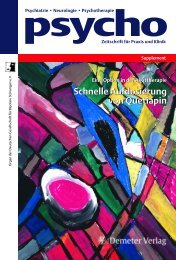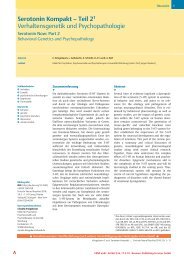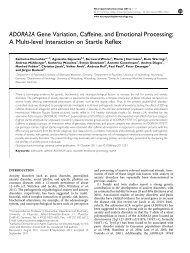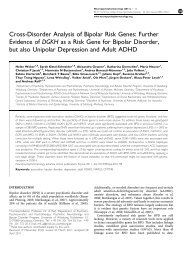Genome-wide linkage analysis of ADHD using high- density SNP ...
Genome-wide linkage analysis of ADHD using high- density SNP ...
Genome-wide linkage analysis of ADHD using high- density SNP ...
Create successful ePaper yourself
Turn your PDF publications into a flip-book with our unique Google optimized e-Paper software.
statistical methods into consideration. This approach<br />
compensates for the disadvantage <strong>of</strong> both the<br />
parametric analyses assuming a disease-model<br />
maximizing the LOD score and the non-parametric<br />
analyses without any model specification, for example,<br />
possibly overestimating versus possibly underestimating<br />
<strong>linkage</strong> in the respective analyses. Overlapping<br />
results obtained by both parametric (MODglobal and<br />
MODsingle) and non-parametric (NPL) statistical<br />
methods are, therefore, supportive <strong>of</strong> robust findings.<br />
The <strong>linkage</strong> scores identified in individual families by<br />
parametric <strong>analysis</strong> were comparable to NPL scores.<br />
Across all families, however, the total NPL scores were<br />
calculated without considering different degrees <strong>of</strong><br />
informativeness between the families, and, therefore,<br />
did not match the respective MOD scores. Although, in<br />
contrast to nearly all previous genome-<strong>wide</strong> <strong>linkage</strong><br />
scans, we discuss only those findings that met the<br />
criteria for genome-<strong>wide</strong> significance suggested by<br />
Lander and Kruglyak, 34 it ought to be kept in mind that<br />
all findings are nominal and not adjusted for multiple<br />
testing. However, since our intention to obtain comparable<br />
results from various statistical approaches<br />
accounts for the dilemma <strong>of</strong> multiple testing,<br />
Bonferroni correction would be too conservative.<br />
In conclusion, we detected novel and replicated<br />
several previously reported <strong>linkage</strong> loci for <strong>ADHD</strong>.<br />
The considerable overlap with earlier genome-<strong>wide</strong><br />
scans indicates that even though the genetic etiology<br />
<strong>of</strong> <strong>ADHD</strong> is complex, there is increasing evidence for<br />
common gene effects throughout different populations.<br />
We propose new susceptibility genes with<br />
possible functional relevance in light <strong>of</strong> existing brain<br />
metabolic models <strong>of</strong> <strong>ADHD</strong>. This genome-<strong>wide</strong><br />
<strong>linkage</strong> scan for <strong>ADHD</strong> employed <strong>high</strong> marker <strong>density</strong><br />
to optimize resolution and novel strategies <strong>of</strong> data<br />
<strong>analysis</strong> were applied to meet the statistical demands<br />
imposed by sample structure and marker <strong>density</strong>. In<br />
contrast to a previously conducted scan in extended<br />
pedigrees, 14 the families are unrelated, ascertained on<br />
the basis <strong>of</strong> tertiary referral and not part <strong>of</strong> a genetic<br />
isolate. The investigation <strong>of</strong> multigenerational pedigrees<br />
is one <strong>of</strong> the most promising approaches to<br />
identify genetic variants associated with disorders <strong>of</strong><br />
multifactorial etiology, as the phenotype within<br />
families is rather homogeneous, and erroneous investigation<br />
<strong>of</strong> phenocopies is, therefore, <strong>high</strong>ly unlikely.<br />
While several whole genome association<br />
(WGA) studies currently underway will likely clarify<br />
whether common variants explain any <strong>of</strong> the reported<br />
<strong>linkage</strong> peaks, some <strong>of</strong> our findings may represent the<br />
effect <strong>of</strong> rare alleles that are not detected easily by a<br />
WGA approach. Although specific limitations <strong>of</strong> the<br />
study design need to be considered, our results<br />
encourage ongoing efforts in the investigation <strong>of</strong><br />
multigenerational families with dense segregation <strong>of</strong><br />
genetically complex psychiatric disorders. Future<br />
investigations will have to include fine mapping,<br />
positional cloning efforts, WGA studies and metaanalytic<br />
approaches to clarify the relevance <strong>of</strong> the<br />
present findings.<br />
<strong>Genome</strong>-<strong>wide</strong> <strong>linkage</strong> <strong>analysis</strong> <strong>of</strong> <strong>ADHD</strong><br />
M Romanos et al<br />
Acknowledgments<br />
We thank all families for their participation and<br />
support. We also greatly appreciate the support from<br />
several co-workers, who contributed to organization<br />
<strong>of</strong> the study, data management and technical assistance:<br />
Andrea Boreatti-Hümmer, Annette Nowak,<br />
Gabriela Ortega, Ulrike Schülter, Nicole Steigerwald,<br />
Theresia Töpner. We thank Pr<strong>of</strong>essor Konstantin<br />
Strauch for supporting us in <strong>using</strong> the program<br />
GENEHUNTER-MODSCORE. This study was supported<br />
by the Deutsche Forschungsgemeinschaft<br />
(DFG: KFO 125, SFB 581, ME 1923/5-1, ME 1923/<br />
5-3, GRK 1389/1) and the Bundesministerium für<br />
Bildung und Forschung (BMBF: 01GV0605).<br />
Conflict <strong>of</strong> Interest<br />
The authors declare no competing financial interests.<br />
Author contributions: The study was supervised and<br />
directed by KPL, JM, CF and AW. MR, HP, CS and CJ<br />
ascertained and clinically characterized the families.<br />
JR, TR, MH and SW contributed to clinical characterization<br />
<strong>of</strong> family members. DWC, RB and DAS carried<br />
out the genetic <strong>analysis</strong>. Fine mapping was carried<br />
out by JS, CV and JM. Data analyses and genotyping<br />
were performed by KPL, MR, TR, AR and co-workers.<br />
Statistical <strong>analysis</strong> was performed by TN, AD and HS;<br />
CWK contributed to the power <strong>analysis</strong>. MR, CF, CJ<br />
and KPL wrote and revised the manuscript.<br />
References<br />
1 Faraone SV, Sergeant J, Gillberg C, Biederman J. The world<strong>wide</strong><br />
prevalence <strong>of</strong> <strong>ADHD</strong>: is it an American condition? World<br />
Psychiatry 2003; 2: 104–113.<br />
2 Kessler RC, Adler L, Barkley R, Biederman J, Conners CK,<br />
Demler O et al. The prevalence and correlates <strong>of</strong> adult <strong>ADHD</strong> in<br />
the United States: results from the National Comorbidity Survey<br />
Replication. Am J Psychiatry 2006; 163: 716–723.<br />
3 Biederman J, Monuteaux MC, Mick E, Spencer T, Wilens TE,<br />
Silva JM et al. Young adult outcome <strong>of</strong> attention deficit<br />
hyperactivity disorder: a controlled 10-year follow-up study.<br />
Psychol Med 2006; 36: 167–179.<br />
4 Jacob CP, Romanos J, Dempfle A, Heine M, Windemuth-Kieselbach C,<br />
Kruse A et al. Co-morbidity <strong>of</strong> adult attention-deficit/hyperactivity<br />
disorder with focus on personality traits and related disorders in a<br />
tertiary referral center. Eur Arch Psychiatry Clin Neurosci 2007;<br />
257: 309–317.<br />
5 Faraone SV, Perlis RH, Doyle AE, Smoller JW, Goralnick JJ,<br />
Holmgren MA et al. Molecular genetics <strong>of</strong> attention-deficit/<br />
hyperactivity disorder. Biol Psychiatry 2005; 57: 1313–1323.<br />
6 Faraone SV, Khan SA. Candidate gene studies <strong>of</strong> attention-deficit/<br />
hyperactivity disorder. J Clin Psychiatry 2006; 67(Suppl 8): 13–20.<br />
7 Friedel S, Saar K, Sauer S, Dempfle A, Walitza S, Renner T et al.<br />
Association and <strong>linkage</strong> <strong>of</strong> allelic variants <strong>of</strong> the dopamine<br />
transporter gene in <strong>ADHD</strong>. Mol Psychiatry 2007; 12: 923–933.<br />
8 Bakker SC, van der Meulen EM, Oteman N, Schelleman H,<br />
Pearson PL, Buitelaar JK et al. DAT1, DRD4, and DRD5 polymorphisms<br />
are not associated with <strong>ADHD</strong> in Dutch families. Am<br />
J Med Genet B Neuropsychiatr Genet 2005; 132: 50–52.<br />
9 Smalley SL, Bailey JN, Palmer CG, Cantwell DP, McGough JJ,<br />
Del’Homme MA et al. Evidence that the dopamine D4 receptor is a<br />
susceptibility gene in attention deficit hyperactivity disorder. Mol<br />
Psychiatry 1998; 3: 427–430.<br />
529<br />
Molecular Psychiatry








